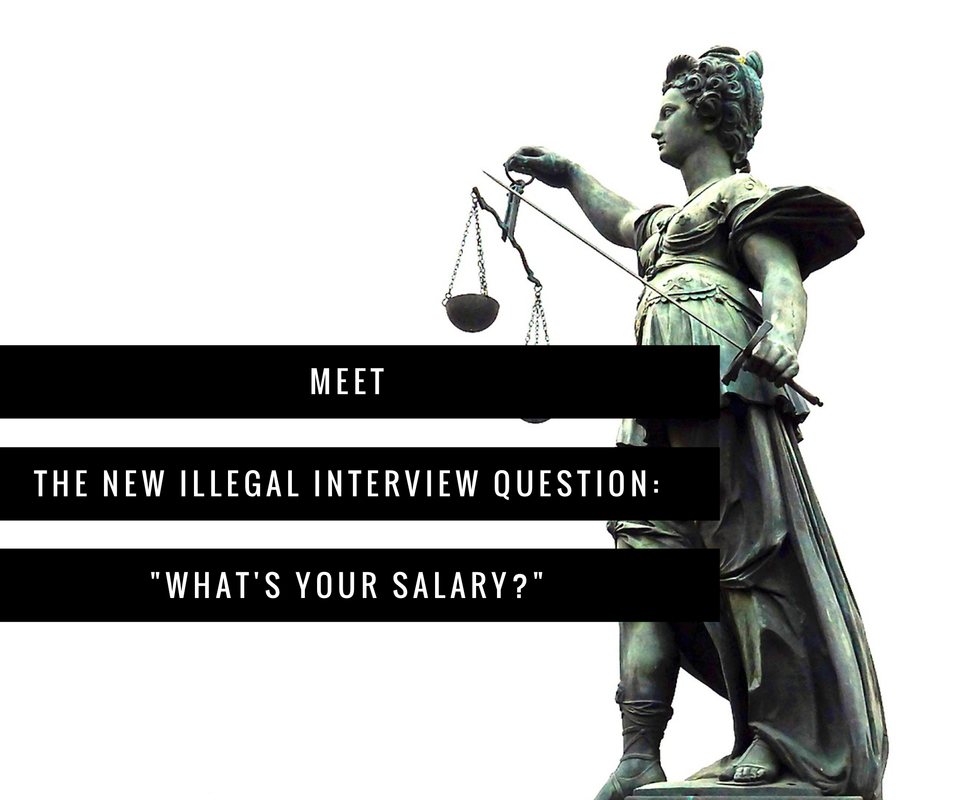NYC has joined Massachusetts & Philadelphia in making it illegal to ask about a candidate's salary history. California (among other states) are considering similar laws. Here's 3 ways that employers, HR & recruiters can cope:
1. Understand the Purpose
In places like Philadelphia (where a Federal court has already temporarily stayed the new law) employers are pushing back, claiming such laws interfere with their ability to run their business & control their costs. As a business owner, the author of this post agrees; as an HR professional, I say that while a "no-salary-inquiry" law may not be the best solution, the problem it is trying to fix is very real and must solved: the long-standing gender gap where on average, women continue to earn substantially less than men - some 80 cents to the dollar according to the Census Bureau (see link at the end of this post). In the case of NYC, the wage gap is even greater, especially among women of color (see link at the end of this post).
That said, employer energies would be better served embracing the trend towards new “no-salary-inquiry” laws as a valid extension of both existing Federal law (the Equal Pay Act of 1963) & many similar equal work/equal pay state laws...then start thinking of constructive ways to live with this growing "no-salary-inquiry" trend…because if it’s not already law in your city/state now, it may be soon.
Here's the basics of the NYC law: it makes it illegal to ask about an applicant's salary history (in writing or in any other form) during the interview process *or* use an applicant's salary history to determine salary or benefits to fill the job...*unless* the candidate voluntarily discloses salary history *without* prompting (more on that later). Penalties for violation can be as high as $250,000.
Among other allowances, the NYC law *does* permit an employer to ask about a candidate's expectations regarding salary or benefits and it *does* allow the employer to disclose a proposed salary or salary range for the job.
2. Practice Pay Transparency
The employers who are best able to defend themselves against equal pay or gender-based pay claims are those who practice pay transparency. The most critical components of pay transparency to follow are:
3. HR Must Find (and Use) Its Voice
In cities/states which already have "no-salary-inquiry" laws, HR compliance actions may include:
In all states - but especially in states that are not yet subject to "no-salary-inquiry" laws - HR needs to find & use its voice. That means:
We hope you found this post helpful and thank you for sharing it with your friends and associates. Bookmark our company website for help with your HR management &resume writing needs...and feel free to explore these additional links: This website (including its blog posts) is a service provided by PhoenixHR LLC, its partners, affiliates or subsidiaries (collectively, "Provider"). This website does not provide legal advice and Provider is not a law firm. Although we go to great lengths to make sure our information is accurate and useful, we recommend you consult a lawyer if you want legal advice. No attorney-client or confidential relationship exists or will be formed between you and Provider or any of our representatives.
1. Understand the Purpose
In places like Philadelphia (where a Federal court has already temporarily stayed the new law) employers are pushing back, claiming such laws interfere with their ability to run their business & control their costs. As a business owner, the author of this post agrees; as an HR professional, I say that while a "no-salary-inquiry" law may not be the best solution, the problem it is trying to fix is very real and must solved: the long-standing gender gap where on average, women continue to earn substantially less than men - some 80 cents to the dollar according to the Census Bureau (see link at the end of this post). In the case of NYC, the wage gap is even greater, especially among women of color (see link at the end of this post).
That said, employer energies would be better served embracing the trend towards new “no-salary-inquiry” laws as a valid extension of both existing Federal law (the Equal Pay Act of 1963) & many similar equal work/equal pay state laws...then start thinking of constructive ways to live with this growing "no-salary-inquiry" trend…because if it’s not already law in your city/state now, it may be soon.
Here's the basics of the NYC law: it makes it illegal to ask about an applicant's salary history (in writing or in any other form) during the interview process *or* use an applicant's salary history to determine salary or benefits to fill the job...*unless* the candidate voluntarily discloses salary history *without* prompting (more on that later). Penalties for violation can be as high as $250,000.
Among other allowances, the NYC law *does* permit an employer to ask about a candidate's expectations regarding salary or benefits and it *does* allow the employer to disclose a proposed salary or salary range for the job.
2. Practice Pay Transparency
The employers who are best able to defend themselves against equal pay or gender-based pay claims are those who practice pay transparency. The most critical components of pay transparency to follow are:
- Know Your Jobs: A job that is not defined is hard to price fairly or accurately. Management & HR should partner to establish a written set of job descriptions for every job in the company, filled or not. These written job descriptions should clearly defines duties, qualifications and pay ranges.
- Know Your Market: with defined job descriptions in hand, employers are better equipped to get a realistic - and objective - handle on pay rates in markets where their job openings occur. "Objective" includes supporting HR's efforts to collect reliable wage and salary survey data. HR has a fiscal responsibility to secure as much free data as it can, but employers should also recognize that some quality survey data costs money...and if carefully selected, can be a worthwhile investment to protect the company given current trends.
- Wage & Salary Administration: the above components should flow into establishing a scientific, rational & balanced system of managing wages and salaries throughout the entire employee life cycle: from interviewing through career progression through separation. This system is typically referred to as a "Wage & Salary Administration" program. HR has the responsibility designing the program & partnering with management to get it finalized and implemented. Wage and salary programs don't need be complicated but once established, they do need to be consistently applied and kept current to avoid becoming a legal liability; therefore, it is essential that HR design programs that are easy for hiring managers to understand & work with when recruiting.
3. HR Must Find (and Use) Its Voice
In cities/states which already have "no-salary-inquiry" laws, HR compliance actions may include:
- Updating written policies.
- Removing all salary history references from applications.
- Training recruiters and hiring managers on how to comply when they conduct interviews.
- Giving serious thought to designing a work process for documenting when a candidate voluntarily discloses pay or benefits history *without* prompting.
In all states - but especially in states that are not yet subject to "no-salary-inquiry" laws - HR needs to find & use its voice. That means:
- If an HR professional (or recruiter) spots a hiring manager decision which appears to perpetuate a gender wage gap, don't just accept it...say something. Engage in a constructive & positive dialogue with the hiring manager to understand why the candidate is being offered less than a similarly experienced male candidate (or incumbent employee). HR understanding the hiring manager's thinking strengthens its ability to defend the employer if a claim arises…and after all, protecting the company is one major part of any HR professional’s job.
- If there does turn out to be a real gender pay gap situation - regardless of whether it was intentional or not - then HR must do all it can to work with the hiring manager and get that pay disparity fixed up front...because doing the right thing is the other major part of any HR professional's job.
We hope you found this post helpful and thank you for sharing it with your friends and associates. Bookmark our company website for help with your HR management &resume writing needs...and feel free to explore these additional links: This website (including its blog posts) is a service provided by PhoenixHR LLC, its partners, affiliates or subsidiaries (collectively, "Provider"). This website does not provide legal advice and Provider is not a law firm. Although we go to great lengths to make sure our information is accurate and useful, we recommend you consult a lawyer if you want legal advice. No attorney-client or confidential relationship exists or will be formed between you and Provider or any of our representatives.




